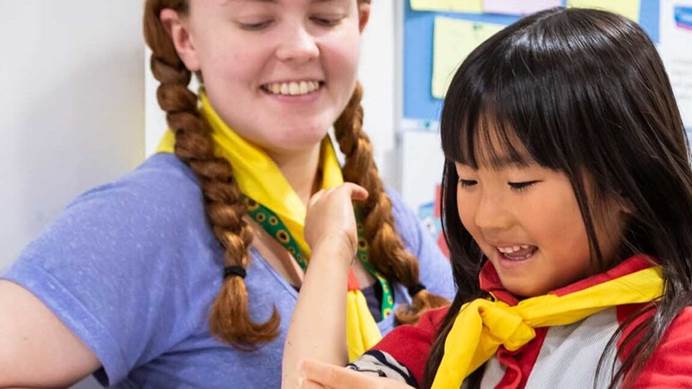Members who are pregnant or adopt
Supporting members and volunteers who get pregnant, have a child or starts an adoption process
If a member or volunteer in your unit gets pregnant, has a child or starts the adoption process, we want to make sure they get the support they need in guiding.
And we need to ensure that their rights are respected throughout.
The Equality Act 2010 makes it unlawful to treat someone unfavourably because they are pregnant, breastfeeding or have recently given birth. For example, it would likely be unlawful to not allow a pregnant woman to take on a role just because of the pregnancy.
Sometimes, people might have good intentions and think they are being helpful by not offering an opportunity to a pregnant volunteer or to a new parent. But you shouldn’t make assumptions. Less favourable treatment is still unlawful, even if it was well intentioned.
Always give the member or volunteer information to help them make an informed choice about what they would like to do and be guided by them in what needs to happen next.
Young members
Girlguiding provides a safe, girl-only space where we support leaders to discuss sex and relationships in their own units. So sometimes young members will approach their leader or other unit volunteers if they're pregnant or think they might be.
Pregnant young members might be very worried. They may not be sure that they want to be pregnant and could ask if they should continue with the pregnancy, to seek an adoption or to seek a termination. You should:
- Reassure them that a mix of emotions is a normal response to the news.
- Stay calm and non-judgmental. Your role is support them to make the right choices for them.
- Help them consider what support they may be able to get from their parents or other trusted adults in their lives.
- Suggest they consider carefully who they share this news with. Remind them that this is personal information and they have a right to confidentiality.
- Advise them to see their GP or a sexual health services to discuss their options. For links to their local service you can visit the Brook website.
Confidentiality and safeguarding
Sometimes a pregnancy can bring to light concerns about a young member or volunteer. Remember that, legally, individuals under 16 can’t consent to sexual activity.
If you have concerns about a member, or are worried that their behaviour is a risk to their unborn child, you can contact your commissioner or email [email protected].
Information about a young member of any age should be kept confidential unless you have reason to believe they or another person is at risk of harm. In these cases, the information must be passed on for their own safety and in line with our safeguarding policy.
Adult volunteers
With adult volunteers, talk about whether they would like others in guiding to know about their pregnancy and how they would like to share the news. No one should feel they have to answer questions about their pregnancy, so make sure you and everyone in the unit respect the boundaries of what they share.
If young members are told, they are likely to have lots of questions. So, the volunteer could think about how they might want to respond to this curiosity before sharing the news.
If there's a pregnancy in your unit, you should work with the young member or volunteer to revisit risk assessments. You now need to consider risks to the pregnant person and their unborn child, and make any adjustments needed to reduce the risks. The key is to work in partnership and not make assumptions about what they can or can’t do. On our risk assessments page we have a pregnancy risk assessment which has been pre-filled with all the risks you need to be aware of.
Many expectant parents will continue to be actively involved in guiding whilst they're pregnant; and might want to join in overseas trips. They should seek medical advice on their suitability to travel; any restrictions on travel to a particular place and their liability for relevant health insurance. You’ll need to consider the risks involved and how this may affect the whole group as well as what the expectant parent would like.
Always be flexible and supportive to potential adopters, as the adoption process can be stressful and time consuming.
It’s likely that they'll be expected to attend courses and undergo a full assessment, so allow volunteers the flexibility to fit this around their guiding commitments. You could be asked to give a reference as someone who knows them well.
Many people will choose to take a break to undergo an adoption assessment, or prepare for life as a parent, when the baby arrives. Unlike taking leave in the workplace, there aren't set rules about taking a break from guiding. Your unit should work around the preferences and the needs of the group.
- Arrange ‘cover’ if a volunteer needs to step back from guiding. This could be a flexible or temporary arrangement with other members of the unit taking on additional responsibilities.
- Have a handover meeting where they pass over any useful resources or information. This will mean you don’t need to disturb them during their break.
- Consider changing activities or responsibilities within the unit – for example, could they volunteer for less time?
- Agree in advance how they'd like to stay in touch during any time away from the unit.
- Remember to change their records appropriately on GO when discussing the communication preferences with HQ.
- Be flexible if they need to attend appointments for antenatal care or adoption assessments. If a volunteer has a pregnant partner, they'll also need this flexibility.
Managing subscriptions
If a member chooses to leave guiding for a break whilst pregnant or during maternity, talk to them about how their GO record will be managed and might be affected.
- Any young member that wishes to leave for a period of time should be made inactive on GO.
- Any volunteer that wishes to leave for a period of time should be made inactive, or can be moved into a district helper role.
Make sure any changes to GO records are done at the time or before the annual subscription deadline so as not to incur unnecessary subscriptions fees.
If a new parent is breastfeeding or needs to express milk, we should be welcoming of this in all Girlguiding spaces.
Some parents may prefer a quiet space where they can sit down to breastfeed. If they’re expressing milk, they’ll need a clean space to prepare pumps or bottles and the ability to store milk in the fridge. Talk to them about what you can do to help make this easy for them. Don’t insist they use a bathroom or toilet.
The Equality Act 2010 says that it's unlawful discrimination to treat someone unfavourably because they're breastfeeding. In Scotland, it's an offence to stop someone in a public place from feeding their child, if under two, with milk. You can be fined for preventing breastfeeding in public places. Be mindful of this in the unit meeting place and on residentials and trips.
The death of a baby at any stage is usually unexpected and can be devastating for the parents and their family. It’s important to acknowledge grief, loss and bereavement, and offer support when it’s appropriate.
It’s natural to worry about saying the wrong thing to a bereaved parent. However, it can be comforting for them to know they're not alone at such a difficult time. You could send a short note simply saying how sorry you are.
If it’s appropriate, you can discuss if they'd like the news shared and then talk about how they might like to return to guiding when they're ready. Always listen to and take the lead from the bereaved parent. Be flexible and sympathetic and remember that guiding may be a support network for them.
Support organisations
Equality and Human Rights Commission - Information about the Equality Act 2010
Birthrights - Charity improving women’s experience of pregnancy and childbirth by promoting respect for human rights.
Maternity Action - Provides information on rights, health and well-being of pregnant women and their partners from conception through to the child’s early years.
Home-Start - Home-Start is a family support charity which has volunteers supporting parents as they learn to cope, improve their confidence and build better lives for their children.
Breastfeeding Network - The independent source of support and information for breastfeeding women and others.
Adoption UK - Leading UK charity with information on the adoption process and support available.
Sands - UK charity to support anyone affected by the death of a baby.
Child Bereavement UK - Supporting families when a baby or child of any age dies or is dying, or when a child is facing bereavement.



